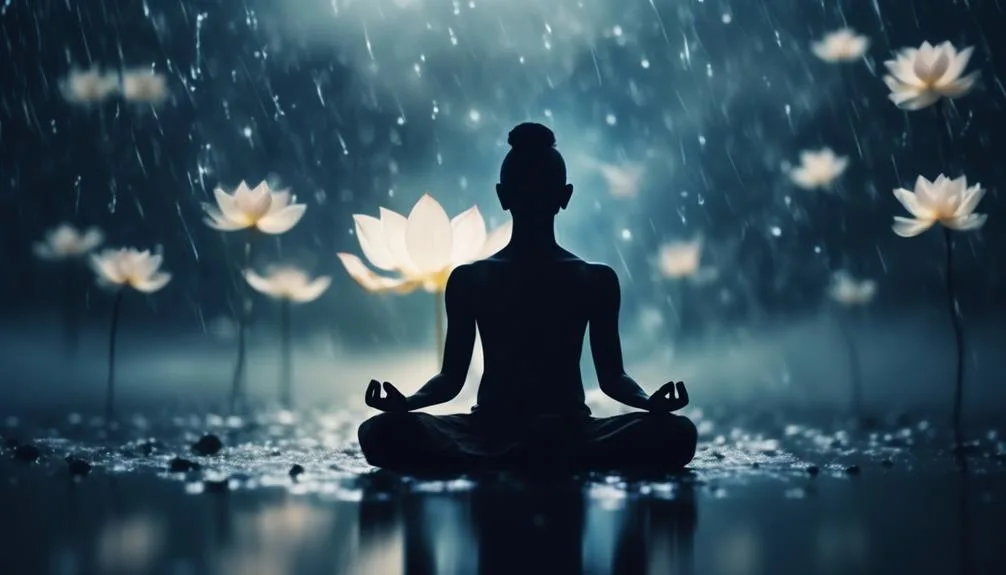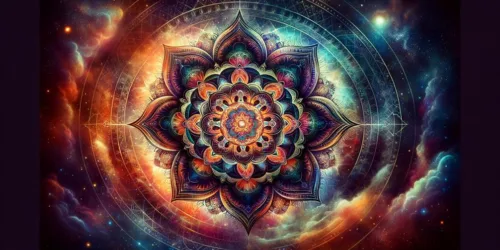Discover the Secrets to Inner Harmony
You might think that inner harmony is a lofty goal, reserved for monks and lifelong meditators, but it's more attainable than you've been led to believe.
As you navigate the complexities of life, it's not uncommon to find yourself at odds with your own thoughts and feelings, questioning whether true peace of mind is even possible.
Yet, the journey to inner harmony begins with understanding the roots of your internal strife. You're about to uncover how the intricacies of your mind can be tamed, leading to a sense of balance that permeates every aspect of your being.
Prepare to explore the subtle art of aligning your values with your actions, and learn how to dissolve the dissonance that holds you back from experiencing a tranquil existence.
What you'll discover may challenge your preconceptions, but it will also open the door to a world where harmony isn't just a concept, but a lived reality.
Key Takeaways
- Internal conflict can manifest in various forms such as moral, sexual, religious, political, love, self-image, interpersonal, and existential conflicts.
- Understanding and recognizing the origin of our thoughts can help us navigate internal conflict more effectively.
- Making wise decisions involves balancing emotions and rationality, weighing pros and cons, and considering long-term consequences.
- Examining our beliefs, questioning underlying assumptions, and addressing negative self-beliefs can contribute to resolving internal conflicts.
Types of Internal Conflict
While you may not always recognize it, the internal conflicts you experience can take various forms, each with its own set of challenges and resolutions. Exploring inner turmoil is essential in understanding the nature of these battles.
You may face moral conflicts, where your principles are at odds with your desires, or sexual conflicts that question your identity and preferences. Religious and political conflicts often reflect deep-seated beliefs, while love conflicts and self-image struggles can shake the foundation of your self-esteem.
Interpersonal issues might strain your relationships, and existential conflicts can challenge the very meaning of your life. Overcoming these internal struggles requires patience, introspection, and a willingness to confront uncomfortable truths.
Understanding Internal Conflict

Often, the first step in resolving internal conflict is acknowledging that your deeply held beliefs, desires, and expectations may not always align, creating a landscape of inner turmoil that you must navigate. Recognizing triggers of discomfort helps you understand the roots of your struggles.
Overcoming internal conflict involves peeling back the layers of your psyche to reveal the contradictions that unsettle you. By doing so, you're not only confronting your current dilemma but also paving the way for more profound personal growth.
It's a courageous journey, requiring patience and self-compassion. Remember, you're not aiming for a life devoid of conflict but rather one in which you can live with authenticity and coherence. Embracing this process is the essence of finding your inner harmony.
Making Wise Decisions

Navigating the crossroads of life's choices, you'll find that making wise decisions requires a delicate balance between listening to your heart and engaging your intellect. Balancing emotions and weighing options isn't just about what feels good in the moment; it's about considering the long-term implications of your choices.
| Balancing Emotions | Weighing Options |
|---|---|
| Acknowledge your feelings | List potential consequences |
| Don't let fear decide | Consider alternative paths |
| Seek inner peace | Prioritize your values |
| Reflect on past outcomes | Evaluate the risks |
Examining Beliefs and Priorities

Before you can truly align your actions with your deepest values, it's essential to scrutinize the beliefs and priorities that guide your life. Questioning beliefs isn't easy; it requires courage and honesty.
You may discover that some beliefs, once integral to your identity, are actually based on fears or outdated perspectives. By overcoming fears, you open the door to a more authentic self. It's about peeling away layers of false, limiting, or second-hand beliefs to reveal your core values.
This process isn't just intellectual—it's deeply personal and transformative. As you identify and address these inner barriers, you'll find clarity in your priorities, and your path to inner harmony will become more evident.
Trust in the journey of self-discovery, and let it lead you to true alignment.
Gaining Perspective and Relaxation

As you peel back the layers of limiting beliefs and align with your true priorities, it's crucial to also cultivate the ability to step back and gain a broader perspective, finding tranquility in the process.
Adopting a future perspective allows you to envision a life untangled by the anxieties of the present.
Imagine:
- A serene lake at dawn, the water still and the air crisp, symbolizing a clear mind.
- A path winding through a lush forest, each step representing progress in your journey to inner peace.
- The quiet solitude of a mountain peak, where the vast horizon mirrors the expansive nature of your thoughts when you embrace relaxation techniques.
Embrace these mental vistas and find your balance.
Frequently Asked Questions
How Do Cultural Influences Impact Our Understanding and Resolution of Internal Conflict?
Cultural influences shape your perceptions, often dictating conflict adaptation methods. Through cultural introspection, you'll understand these impacts, leading to more effective resolutions of your internal struggles.
In What Ways Can Internal Conflict Lead to Personal Growth and Positive Transformation?
You're wrestling with internal conflict, aren't you? It's the gym for your soul, where conflict resolution becomes the weights for personal evolution, shaping resilience, empathy, and insight—key for your transformative journey.
What Role Does Physical Health Play in Managing and Overcoming Internal Conflict?
Your physical health, particularly mental resilience and sleep quality, plays a crucial role in managing internal conflict by bolstering your emotional stability and capacity to address stress constructively.
How Can We Differentiate Between Constructive Self-Criticism and Harmful Self-Doubt When Dealing With Internal Conflict?
You're wrestling with self-critique, huh? Constructive criticism sparks growth, while harmful doubt just drags you down. Use self-awareness techniques and mindfulness practice to distinguish; they'll guide you without the inner turmoil.
You might find personal paradoxes when seeking inner harmony, causing more conflict. Navigate this by reflecting on your intentions and embracing the journey's ups and downs with patience and self-compassion.
Conclusion
In your heartfelt hunt for harmony, remember, reconciling internal rifts requires reflection and resolve.
Foster flexibility, not just in thought but in action.
As you peel back personal paradigms, permit peace to permeate your presence.
Trust this trek to teach you tranquility.
You're capable, and your quest for inner quietude is quintessential.
Embrace each experience, eager and enlightened, and watch as wondrous waves of wisdom wash over your well-tended soul's sanctuary.






